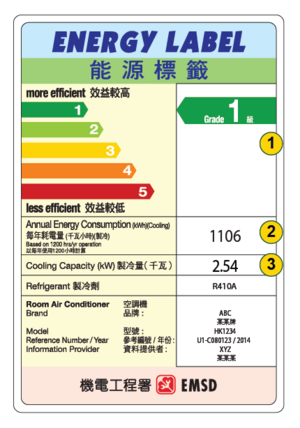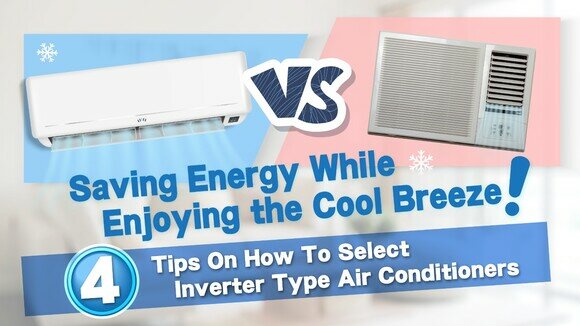First of all, Let MIRROR tell you how to choose a ‘2 horsepower’ window-type air conditioner!
‘MIRROR x Review on Window-Type Air Conditioners’ https://www.youtube.com/watch?v=syOgzq70tO0
Fixed capacity type vs. inverter type
Nowadays, newer split-type cooling-only or reverse cycle air conditioners that are available on the market are mainly inverter type. Conventional fixed capacity type air conditioners are being gradually phased out. Why? What are the differences between these 2 types?
Fixed capacity type | The compressor runs at a fixed top speed, and pauses and restarts repeatedly to adjust the room temperature. |
Inverter type | The compressor automatically adjusts the speed within a certain range. Usually, it runs at a high speed in the beginning, and reduces the speed automatically when the room temperature is closer to the target temperature. |
How does it relate to energy-saving?
A compressor typically consumes less energy at lower speed. Moreover, it also operates more efficiently at lower speed, which is the key to energy-saving.
´Grade 1’ home appliances may vary in electricity costs by 56% annually
In the first half of 2021, the Consumer Council (the ‘Council’) tested 14 inverter split-type reverse cycle air conditioners. Although all of them rated Grade 1 on the energy label, their energy efficiency varied significantly! Assuming all models were used in an environment with the same cooling requirement, using the less energy-efficient model could cost 56% more in electricity tariff! Therefore, if you want to reduce electricity costs and contribute to environmental protection, you will have to choose your air conditioner carefully!

Are you eager to find out which model is good? Please refer to the article ‘Energy Saving, Environmental Friendly, Fast-Cooling 1½ Horsepower Inverter Split-Type Air Conditioners’ (Chinese version only) in issue #534 of CHOICE Magazine.
Inverter window-type air conditioners
In the past, inverter technology was mainly used in split-type air conditioners. Nowadays, there are more inverter window-type air conditioners available on the market, giving more choices to consumers who have space constraints.
Tips for choosing inverter type air conditioners
1. Installation: Inverter window-type air conditioners can be larger and heavier
Due to the more complex mechanical design, inverter window-type air conditioners can be 10cm deeper and heavier than fixed capacity ones with similar cooling capacity. Consumers consider installing inverter window-type air conditioners should check whether the space is suitable and large enough for installation.
2. Energy efficiency: Inverter split-type is better than window-type
If we compare the test results published by the Council in 2017 on inverter split-type air conditioners to the results on inverter window-type air conditioners in 2019, it is found that inverter window-type air conditioners are less energy efficient than inverter split-type ones.
3. Cooling capacity: Watch out for exaggerated claims
Cooling capacity refers to the speed at which the air conditioner removes heat from the indoor air to outdoors. The higher the value, the faster it cools.
If the cooling capacity of an air conditioner cannot satisfy the cooling requirement of the space, the unit will have to operate at high speed for a long time. And users will not reap the benefits of an inverter type air conditioner in terms of high energy efficiency.
The Council tested 14 ‘1 ½ horsepower’ inverter-type air conditioners in April 2021, and found that the cooling capacity of most models was roughly in line with the claimed value. Among them, the cooling capacity of 9 models was in line with or higher than the claimed value, with 1 model having a cooling capacity 6.6% higher than the claimed value. 4 other tested models had discrepancies within the acceptable 10% tolerance range under the Code of Practice on Energy Labelling of Products and common international practices. Only 1 model whose actual cooling capacity was 17.6% lower than the claimed value and its performance was only equivalent to an ‘1 horsepower’ air conditioner.
4. Airflow rate : The higher, the better
The higher the airflow rate, the more air can be blown out by the air conditioner. This can improve air circulation and help to achieve an ideal room temperature faster, thus making users feel comfortably cool. In addition, the fan speed should have a wide enough range. The wider the fan speed range, the better the performance, as otherwise the user cannot feel the differences under different speed settings.
Areas to watch out when using inverter type air conditioners
Set the target temperature by phases
If you don’t have an urgency to cool down quickly, and don’t mind that the room temperature gradually lowers, you may set the target temperature by phases. At first, don’t set the target temperature too low. Instead, you can set the target temperature only a little bit lower than the prevailing room temperature and adjust it downwards bit by bit (for example, every 15 minutes) until the desired temperature is reached. This can help reduce the time that the inverter type air conditioner has to operate at high speed, thus achieving additional energy saving.
Other tips on energy saving
Electricity costs rise with the actual cooling requirement which can be escalated by various factors such as humidity, larger room size, windows facing direct sunlight, air leakage through doors and windows, running exhaust fans, multiple appliances running at the same time, or a large number of people in the same room, etc. Therefore, it is recommended to draw the curtains to avoid direct sunlight, close the doors and windows where possible to maintain the interior temperature, and do not block the air inlet / outlet of the air conditioner.
Some more tips on energy saving:
- During summer, it is recommended to clean the air conditioner's dust filter, air inlet and outlet once every 2 weeks to prevent airflow obstruction which may impact its performance. Arrange for regular checks, maintenance and repair by an experienced technician.
- During summer, you may feel extremely hot when you return home. You can take a shower or drink some water to quickly cool down your body. Therefore, it is not necessary to set the target temperature too low. It is recommended to keep the room temperature at around 25.5°C in summer.
- During winter, using the heating function of a reverse cycle air conditioner can save more energy than using an electric or a fan heater.
- An electric fan consumes less energy than an air conditioner. If both the air conditioner and electric fan are turned on at the same time, cool air can be blown towards the user. In this way, the target temperature of the air conditioner can be set at a higher level, thus saving more energy.
- If the air conditioner has a timer, preset a switch-off time to avoid using it for too long or forgetting to turn it off.
- In order to reap the full benefits of an inverter type air conditioner in terms of high efficiency and energy savings, avoid prolonged operation of the unit under full load. Ensure that the air conditioner only operates at high speed for a short period of time when it is initially switched on. Subsequent cooling only requires the unit to operate at a low speed.
Using low fan speed for dehumidification? This is not energy efficient!
The cooling function of air conditioner can bring 2 effects on the air, with the primary one being the lowering of air temperature and the other being dehumidification. Moisture is removed through a pipe in a split-type air conditioner. If you want to achieve better dehumidification result, choose a lower fan speed. However, a lower fan speed setting will hinder the full cooling capacity of the air conditioner, resulting in lower energy efficiency. Therefore, it is not recommended to frequently use a low fan speed setting unless necessary.
Practical tips on installation and maintenance
Installation instructions
Some retailers include basic installation service in the marked price, but consumers should check before buying to be sure. If there is no designated cement space for the air conditioner unit, and that it has to be installed on a window frame, consumers should ensure that the window frame and supporting structure are strong and secure enough to hold the unit. Even if there is a designated space, the air conditioner unit must be firmly secured on the cement space. In addition, the metal frame must be connected with equipotential bonding to minimise the risk of having accidental electric shock.
Nowadays, some newer-style residential buildings, especially those with glass screen walls, lack considerations with respect to residents’ specific requirements in the installation and subsequent maintenance of air conditioners. Residents may only be able to install split-type air conditioners within designated spaces and it is not possible to install window-type units. Moreover, a gondola will need to be booked in advance for the installation and maintenance of the air conditioners. Consumers should therefore take into consideration the higher budget (for both installation and subsequent maintenance) and time involved.
Pay attention to the warranty period
Some dealers may set a time limit and may not accept any warranty renewal if the air conditioner has been used for a certain period of time, or require an onsite inspection before deciding whether to accept the renewal request. Furthermore, warranty renewal may be refused for remote areas. Therefore, prior to the renewal date, consumers should check the various terms with the agent, including waiver provisions on transportation fee, labour and spare part costs, etc, before making any decision on renewal.
Tips on the disposal of air conditioners
Under the Producer Responsibility Scheme on Waste Electrical and Electronic Equipment (WPRS), consumers should ensure that used air conditioner units and other regulated electrical equipment (REE) are properly collected to reduce their impact on the environment.
In addition to requesting the seller to arrange for a free statutory removal service when purchasing a new air conditioner unit or other REE, consumers may also use the following services:
- Call the Collection Hotline (2676 8888) for collection enquiries and arrange for collection services;
- Send the used appliances to suitable recyclers via the ‘GREEN@COMMUNITY’ program for proper disposal;
For further details, please visit www.weee.gov.hk
After-sales service
The warranty period provided by different agents may differ. For example, it may range from 12 to 39 months. The compressor is a more durable component, and therefore its warranty period is generally longer. Some agents even provide a lifetime warranty.
During the warranty period, users in urban areas are generally provided with free onsite inspection services. As for users living in remote areas, charges are usually required. If an air conditioner requires repairment, as long as the defects are not caused by human factors, most warranties of new units will waive the costs of labour and spare parts.

Want to find out more on window-type air conditioners while watching MIRROR? Please refer to the article ‘2 Horsepower Window-Type Air Conditioners: Inverter Types Are Quieter and Can Save More Energy than Fixed Capacity Types’ (Chinese version only) in issue #511 of CHOICE Magazine.
If you have decided to install an inverter split-type air conditioner, you may refer to the detailed report in the article ‘Energy Saving, Environmental Friendly, Fast Cooling 1½ Horsepower Inverter Split-Type Air Conditioners’ (Chinese version only) in issue #534 of CHOICE Magazine.
Further reading:
‘4 Key Tips To Enjoy The Cool Breeze Without Breaking The Bank?’
https://www.consumer.org.hk/en/shopping-guide/tips/2020-tips-electricbill






![[Baby Snacks Guide] Who Says Snacks Can’t Be Healthy?](/f/guide_detail/415742/376c212/bb%20snack.jpg)




